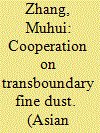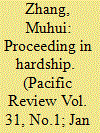| Srl | Item |
| 1 |
ID:
192959


|
|
|
|
|
| Summary/Abstract |
In this article, I investigate Korea's prudential environmental diplomacy with China regarding transboundary fine dust pollution from the perspective of Korea's disadvantageous position vis-à-vis China due to the ambiguity of pollution responsibilities and geopolitical constraints. Against this backdrop, Korea has tactically exercised prudential environmental diplomacy toward China in dual tracks. First, it has taken a "high-profile" stance in engaging with and socializing China into bilateral and multilateral frameworks and endeavors to align its environmental interests with those of China via scientific and technological cooperation. Second, Korea has undertaken a cautious procedure and is not pressuring China by pursuing legal-binding approaches immediately. I see a "mixed success" of Korea's environmental engagement with China and appraise Korea's policy flexibility and pragmatism.
|
|
|
|
|
|
|
|
|
|
|
|
|
|
|
|
| 2 |
ID:
159329


|
|
|
|
|
| Summary/Abstract |
The establishment of the Trilateral Cooperation Secretariat (TCS) marks a milestone for China–Japan–South Korea trilateral cooperation in 2011. This article investigates the TCS’s foundation, structure, and policy influence within the broader context of trilateral cooperation. On one hand, the secretariat acts in many aspects as more than just a ‘secretariat’. It carries a wide range of mandates and is equipped with the potential for action. On the other hand, this study finds that the secretariat has not been developed to be a ‘strong’ and ‘good’ office. The TCS is granted limited autonomy, and has not developed a full-blown ‘independent character’. Its policy contribution has not yet extended to more targeted fields of functional cooperation. Furthermore, its exercise of agenda-setting remains limited as the TCS largely take their cue from the three governments. This study puts forward specific recommendations for the secretariat building in terms of institutional reform and capacity building.
|
|
|
|
|
|
|
|
|
|
|
|
|
|
|
|
| 3 |
ID:
160009


|
|
|
|
|
| Summary/Abstract |
In recent decades, the development of trilateral institutions among China, Japan and South Korea has begun to take shape. This study analyzes its strengths and weaknesses with regard to the nexus between trilateralism and bilateralism. A well-functioning trilateral grouping needs to overcome two structural limitations – dilution effects and bilateral constraints – both of which are triggered by embedded bilateral approaches. The critical juncture approach is effective in terms of elevating the payoffs of cooperative trilateralism during times of exigency. However, once common crises have dissipated, trilateralism has revealed starkly different performances with respect to functional and political-diplomatic cooperation. This article adopts a dichotomous approach between the two. Functional trilateralism has been steadily growing, and has proven to be less subject to fluctuations in the nations’ political relationships. Its outcomes are positive and worthy of praise. However, the outcomes of trilateralism have been less convincing in fields of middle and high politics. Trilateralism is overwhelmingly subject to fluctuations when its embedded bilateral relations change, and cooperative outcomes within a trilateral grouping are prone to being diluted by bilateral approaches. China–Japan–Korea trilateralism at diplomatic levels remains more an extension of bilateral relations than a mature form of minilateral arrangement.
|
|
|
|
|
|
|
|
|
|
|
|
|
|
|
|